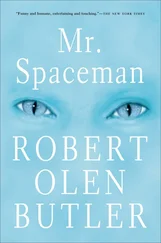Henry looks straight into the camera and wipes the back of his hand heavily across his mouth. He heard the question. And Hatcher thinks of cheeseburgers, of Bill Clinton winning his presidency by eating cheeseburgers, and how sad a figure he is in Hell without them.
Hatcher finds a far corner of the veranda and puts his back to everyone, wanting to be alone now, making his mind go blank, feeling he knows very little about himself, really, and not expecting to learn much from the one wife left to see. But he will try. He will try. He does not have long to wait before he hears the rush of the Fleetwood and the grinding of its brakes. He goes to the car and gives Dick Nixon Naomi’s address.
Naomi Jean Delancey — later Naomi Jean Rutherford, the not-yet-forty trophy widow of a didn’t-quite-get-to-seventy shipping magnate, and then, three years later, the third and final wife of network anchorman Hatcher McCord — lives in a warren of alleyways next to the Central Power Station, the narrow passages twisting and always dark from the shadow of the buildings and from the vast, lolloping, pitch-black plumes of power station smoke, the natural color of Naomi’s hair in her prime. Hatcher moves along a shabby-carpeted inner corridor redolent of piss, its darkness broken only by three widely spaced bare lightbulbs hanging from the ceiling on fraying cords. As he passes, doors open and women peek out, haggard faces with hair disarranged, but disarranged, Hatcher realizes, from former haute coiffure. He knows this neighborhood. This is the Central Park West of Hell. High society. Naomi adored her Chanel and Dolce&Gabbana and also her Lagerfeld and Westwood and Mugler. She adored the Dakota. She adored Hatcher, mostly, though he came to feel that was largely for the opportunity he gave her to radiate at parties, in her couture, in the presence of Hatcher’s most important news subjects, presidents and ambassadors and movies stars and kings.
He is at her door now. He hesitates. Can she shed any light on his sins? She was no trophy at all to him — he knew she was smart — and she knew he knew it and she clearly appreciated that, but she finally did leave him a couple of years before he died and it wasn’t for another man, but for the death of him he can’t remember why, exactly. They ran down, she didn’t like his cigars, she was too smart, finally, to stay interested in primarily glittering in her clothes. Something. They both had affairs — that may have been it, but it was quietly mutual, and surely that was a symptom, not a cause. She was dating a U.S. Senator when Hatcher’s heart stopped, and he wonders if she came to the funeral — he wonders if any of his wives came to his funeral.
He knocks on the door. There is no answer, but he thinks he hears sounds inside, a vague scuffling. He knocks again. He can hear nothing now. Nevertheless — perhaps this comes with a free mind in Hell — he senses her just on the other side of the door. He could be wrong. He knocks again.
“Naomi?” he says.
Naomi is, indeed, on the other side of the door, terrified, always, about being in Hell, particularly because she is wearing a polka-dot pink summer dress with an elastic waist that would have cost twenty-five bucks out of the Sears catalog in the year she married the anchorman, and she has not been able to take this dress off for many risings and settings of the sun and the pink has turned mostly gray now from the grit which settles through the ceiling and walls from the power station. At the sound of Hatcher’s voice, which she recognizes at once, she lays her forehead quietly against the door: Not like this. I am not who I am, wearing this. I am not who I am in the company of the person who has just now slipped into the bedroom. But in this dress, in this society, I am this other. And I was another I, once. I chose myself and dressed me in myself and I was I. Though I had to make do at times. My sweet young self, debuting in the Continental Ballroom in the Peabody Hotel in Memphis in a white satin gown that Mama and her Memphis-Main-Street tailor and I figured out, and it had a strapless bodice and a ruched midriff and lace appliques, and I put the me of that dress on and I melted perfectly into the floor in a full court bow before the society of my mama’s boozy peroxide-bleached friends and the U of M’s boozy sun-bleached Sigma Chis and the Citadel boys in their uniforms and buzz cuts, and it wasn’t until later that I realized how not-me I was, though in a way that was me at nineteen, I suppose, but I was more me later, much more, I was me in a power-black Thierry Mugler with wide shoulders and collar points and flame cutouts and a waist corseted down to breathlessness, to breathless dominating otherness, and I was in the society of the people who ran the world. The world. The world that came and went. And now I am I in another world. I am forever a cheap cotton dress the color of Pepto-Bismol.
Hatcher knocks again. “Naomi? It’s Hatcher,” he says.
“I’m not here,” she says.
“Then let me in and I’ll wait for you,” he says.
“I don’t expect to show up ever again,” she says.
“Is there someone else I can talk to?”
“You don’t want to.”
“I do.”
“Believe me, you don’t.”
“It’s your worst about me I’m looking to hear,” he says.
“It’s worse than that,” she says.
“I don’t care,” he says. There is a long pause. “It’s Hell,” he says, trying to put the shrug that just went through his upper body into his voice.
He feels exhausted. He leans his head against the door. Though he sensed her here even before she spoke, he does not sense that his right temple is lying against the exact spot on the door where, inside, the center of Naomi’s forehead, just below the hairline, is touching.
They both stand there like that in silence for a time. Finally, he says once more, softly, “Naomi?”
And she opens the door.
He sees her dingy polka dots and knows how she is suffering.
She sees his powder-blue tie, and her hands claw at the bodice of her Sears dress, bunching the cloth, pulling it toward her throat. “So,” she says. “You’re still traveling in the right circles.”
This time she can see his shrug.
They don’t move. She is blocking the doorway with her body.
“May I?” he says.
She looks around her, a little uncomprehending. She turns her body to the side.
He steps in. She closes the door.
There are a few pieces of tattered Goodwill-bargain-back-room furniture and there are a thousand roaches crowding along the baseboards like the people in the streets. As soon as Hatcher sees them, they all stop, rise up on their back feet, and look in his direction. He knows how they must torture Naomi. He lifts his tie at them. The whole throng of roaches sings out in unison, “Cheese it! The cops!” and they instantly flow into the join of the baseboard at the floor and vanish.
Naomi has watched this and turns her face to him. Her eyes — still darkly beautiful in spite of the age lines — are wide with surprise.
“The right circles,” Hatcher says.
“Thank you,” Naomi says.
She closes the door, and the two stand awkwardly where they are.
“Can we talk for a few minutes?” Hatcher says, looking toward the little setting of spring-sprung and stained metallic tweed sectionals. He misses Naomi’s eyes sliding away to the bedroom door and then back again.
“Okay, Hatcher,” she says, and he doesn’t catch how she says his name just loudly enough to be heard in the other room. “You can stay for a few minutes.”
They sit at right angles on a two-piece sectional sofa, with a matching chair at the other angle. Naomi has her arms crossed over her chest, covering as much of her dress as possible, her hands laid on her throat as if she were about to choke herself.
Читать дальше













